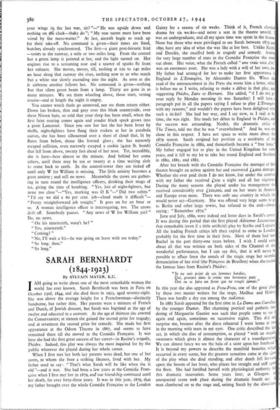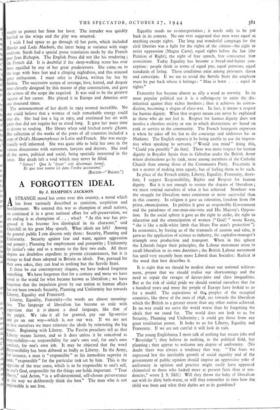SARAH BERNHARDT (1844-1923) ,
By SYLVAIN MAYER, K.C..
1 AM going to write about one of the most remarkable women the world has ever known. Sarah Bernhardt was born in Paris on October 23rd, 1844, and she died there in 1923, aged seventy-eight. She was above the average height for a Frenchwoman—distinctly handsome, but rather thin. Her parents were a mixture of French and Dutch, of Jewish descent, but Sarah was baptized at the age of twelve and educated in a convent. At the age of thirteen she entered the Conservatoire; at sixteen she gained the second prize for tragedy; and at seventeen the second prize for comedy. She made her first appearance at the Odeon Theatre in 1867, and seems to have remained there till she moved to the Comedic Frangaise. It was here she had the first great success of her career—in Racine's tragedy, Phedre. Indeed, this play was always the most inquired for by the public wherever she played during her whole career.
When I first met her both her parents were dead, but one of her aunts, to whom she bore a striking likeness, lived with her. My father used to say : "That's what Sarah will be like when she is old "—and it was. She had been a few years at the Comedic Fran- caise when I first met her in 1879, and' our friendship continued until her death, for over forty-three years. It was in this year, 1879, that my father brought over the whole Comedic Francaise to the London
Gaiety for a season of six weeks. Think of it, French classical drama for six weeks—and never a seat in the theatre unsold. I was an undergraduate, and all my spare time was spent in the theatre. None but those who were privileged to see Sarah between 1879 and 1895 have any idea of what she was like at her best. Unlike Rachel and Desclie, she excelled both in tragedy and comedy. Among the very large number of stars in the Comedic Francaise she stood out alone. Her voice, what the French called " une vraie voix &or,' was an enormous asset. She was a lady with a will of her own, too. My father had arranged for her to make her first appearance in England in L'Etrangere, by Alexandre Dumas fils. When she read of the announcement in the Press she wrote him a letter, which is before me as I write, refusing to make a debut in that play, and suggesting Pitedre, Zaire or Hernani. She added, "if I do not get your reply by Monday morning (it was Saturday) I will have a paragraph put in all the papers saying I refuse to play L'Etrangere with my reasons," and wouldn't the papers have been delighted with such a tit-bit? She had her way, and I say now, as I said at the time, she was right. She made her debut in England in Phedre, and the success was astounding. Nesbit, the dramatic critic of The Times, told me that he was "overwhelmed." And he was not alone in this respect. I have not space to write more about the 1879 season. Sarah resigned her position as a societaire of the Comedic Francaise in x88o, and thenceforth became a "free lance." My father engaged her to play in the United Kingdom for some years, and it fell to my lot to take her round England and Scotland in 188o, 1881, and 1882.
After her breach with the Comedic Francaise the manager of that theatre brought an action against her and recovered L4,000 damages. Whether she ever paid them I do not know, but under the contract with my father she received Lino a night and all her expenses During the many seasons she played under his management she received considerably over Licio,000, and on her tours in America and Europe even more. There was only one country in which she would never act—Germany. She was offered very large sums to go to Berlin and other large towns, but refused to the end—always saying : "Remember 1870."
June and July, 188o, were indeed red letter days in Sarah's career. It was during this period that she first played Adrienne Lecouvreur, that remarkable (even if a little artificial) play by Scribe and Legoure All the leading French critics left their capital to come to London probably for the first time in their lives. Most of them had seen Rachel in the part thirty-one years before. I wish I could write about all that was written on both sides of the Channel of this wonderful performance, but I can say this, that it will never be possible to efface from the annals of the tragic stage her scornfu denunciation of her rival (the Princesse. de Bouillon) when she recited the famous lines from Racine's Phedre:
ne suis point de ces femmes hardies,
Qui, goutant dans le crime une honteuse paix su se faire un front qui ne rougit jgmais."
In this year she also appeared as Frou-Frou, one of the great plays by those two master writers for the stage, Meilhac and Haler, There was hardly a dry eye among the audience.
In 1881 Sarah appeared for the first time in La Dame crux Camilias by the younger Dumas. Her charming poetical and pathetic ren dering of Marguerite Gautier was such that people came to see again and again, sometimes on successive nights. This dfd not surprise me, because after the dress rehearsal I went home at tl% in the morning with tears in my eyes. One critic described the la' act, in which she dies of consumption, as played "with an ange sweetness which gives it almost the character of a transfigurat:or We can almost fancy we see the halo of a saint upon her forehead It is beyond my powers to describe the manifold beauties whic occurred in every scene, but the greatest sensation came at the 40,, of the play when she died standing, and after death fell forwarc upon the bosom of her lover, who places her straight and stiff u the floor. She had fortified herself with physiological authority this dramatic innovation. Some years later, at Glasgow, unexpected scene took place during the dramatic fourth act. Man clambered on to the stage and, seizing Sarah by the should
sought to protect her from her lover. The intruder was quickly bustled to the wings and the play was resumed.
I wish I had space to go through all her parts, which included ad liamiet and Lady Macbeth, the latter being at variance with stage traditton. Sarah had a special prose translation made by the French od poet Jean Richepin. The English Press did not like his rendering ; the French did. It is doubtful if the sleep-walking scene has ever been equalled by any of her great predecessors. She came, on to the stage with bare feet and a clinging nightdress, and this aroused great enthusiasm. I must refer to Fedora, written for her by ch Sardou. The successive scenes of revenge, love, hatred, and despair were cleverly designed by this master of play construction, and gave the actress all the scope she required. It was said to be the greatest success of her career. She played it in Europe and America over one thousand times. • The announcement of her death in 1923 seemed incredible. No one could believe that a woman of such remarkable energy could
ocf ever die. She had lost a leg in 1915, and continued her art with of parts that did not require her to stand long. It gave her more time
tot to devote to reading. Her library when sold fetched nearly £8,000. Her collection of the works of the poets of all countries included a copy of Ovid's Metamorphoses in Latin and French. She was excep- tionally well informed. She was quite able to hold her own in the various discussions with statesmen, lawyers and doctors. She read all the news, political and social, being specially interested in the latter. Her death left a void which may never be filled.
" Sortez! Que le 'foyer' soil disormais fermi, Et que tout rentre ici dens l'ordre accoutumi."
(RAcrNE—" Bajazet.")



























 Previous page
Previous page